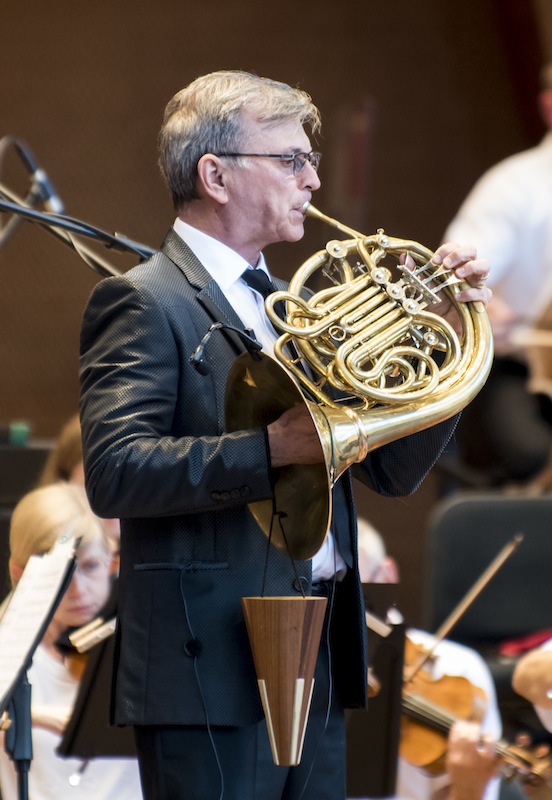Music and political worlds collide with Grant Park Festival premiere

There are probably as many good reasons why a musical work shouldn’t be dedicated to a politician as there are redundant jobs in Cook County government.
The penultimate weekend of the Grant Park Music Festival brought the sole world premiere of the summer with Legacy, a horn concerto by Aaron Jay Kernis, which debuted Friday night at the Pritzker Pavilion. Grant Park Orchestra principal horn Jonathan Boen was the soloist with Carlos Kalmar leading the Grant Park Orchestra.
Jointly commissioned by the Grant Park Music Festival and the Royal Liverpool Philharmonic, Legacy is dedicated to President Barack Obama. Kernis states in his program note that the former president’s farewell address in Chicago was “an inspiring summation of the previous eight years” that “rests incongruously next to the daily turmoil that has taken hold since then.” Legacy, he adds, is “an abstract work” as well as “a record of personal emotions and thoughts.” But mainly the concerto is “dedicated to President Barack Obama to honor his humanity, humility, intelligence and inspiration as the nation’s former leader.” I guess we can put the composer down as undecided.
Scored for backing strings, harp and percussion, Legacy is a concise horn concerto in three movements running 20 minutes. In the opening section (“Will”) a noble, rising theme for the soloist emerges over hushed strings. A not too-dramatic quicksilver section ensues with a lyrical passage beginning in the cellos and passing to the horn alternating with amiable bustle. In the second movement (“Divide”) the horn has a forthright solo theme with an air of defiance; the concerto’s protagonist appears to join battle with opponents as represented by the satiric percussion writing. The conflict is dispelled by a radiant theme for solo cello–beautifully played by Walter Haman– and the horn muses on the same music at the coda.
The finale (“Grace”) opens with a syncopated theme that turns increasingly agitated, moving from hard cello and bass pizzicatos to dragging strings chords and disruptive timpani. The solo horn eventually gains the upper hand over the orchestral rancor by playing “Amazing Grace” in a quiet, dignified manner. The soloist repeats the famous hymn in a long, extended diminuendo–Boen stepping off the stage and continuing to play as he slowly walked up the aisle of the pavilion until his instrument faded into silence.
I’ve long been an admirer of Kernis’s music but I can’t say that Legacy is one of his stronger works. The music is gracious and well crafted yet rather meandering and empty at its core, with slender thematic material and by-the-numbers writing for orchestra. And while theatrically effective, the “Amazing Grace” walk-away farewell is decidedly lame and musically trite regardless of one’s political sympathies. Copland’s Lincoln Portrait suddenly seems a bit less bad.
No complaints about this premiere performance. Jonathan Boen, long a stalwart member of the Grant Park ensemble, was a supreme exponent, performing with rounded, glowing tone, seamless technical facility and impeccable control, even while exiting the stage and walking up the aisle. Boen’s colleagues lent finely judged support with Kalmar quelling the noisy al fresco milieu enough to allow Boen’s quiet coda to register clearly.
Tchaikovsky’s Manfred Symphony closed the evening. Manfred is based upon the Byron poem of the same name and Tchaikovsky clearly identified with the poem’s wandering, haunted anti-hero. Written between Nos. 4 and 5, Manfred is the largest of the Russian composer’s seven works in the genre and the least performed. Though cast in the traditional four movements, the scale is vast, spanning over an hour in most performances.
The programmatic work doesn’t quite rise to the level of the Russian composer’s finest symphonies with an unwieldy structure and overlong and episodic finale. Still, there is much magnificent music in Manfred not least the darkly dramatic opening movement, which is among Tchaikovsky’s most inspired creations.
Carlos Kalmar is often at his best in neglected byways of the Romantic era and the festival’s artistic director led a superbly paced performance that made the best possible case for this work. Kalmar pared down the volume and bombast yet Manfred’s thrusting motto theme–which recurs throughout the symphony–was aptly dark and driven, contrasted with the airy grace of the theme for his beloved Astarte.
The middle movements provide relief from the prevailing brooding grimness of the music. Tchaikovsky’s elfin fairy scherzo offers a kind of retooled Mendelssohn though the big central melody is Tchaikovsky through and through. Especially fine playing by the orchestra here and in the ensuing pastoral Andante, where the baleful Manfred theme breaks in like an unwanted guest.
The sprawling finale is the symphony’s weak link, unaided Friday by a weak and tinny electronic “harmonium” at the climax. Still, the fire and whipcrack intensity of the Grant Park Orchestra’s playing almost made one a believer, with Kalmar especially artful in the challenging turn into the hushed coda.
The evening led off with the Overture to Rimsky-Korsakov’s opera The Tsar’s Bride. The opera is largely forgotten these days but the overture made an enjoyable curtain-raiser. Kalmar led a supple, elegant performance that brought out the gracious charm of the music.
The festival acknowledged retiring musician Charlene Zimmerman Friday evening. Zimmerman retired at the beginning of this season after 39 years with the Grant Park Orchestra, the last 29 as principal clarinetist. She served as chairman of the orchestra’s audition committee for 23 seasons and performed Debussy’s Premiere Rhapsody as well as Fred Fisher’s “Chicago”–in the celebrated Benny Goodman arrangement–several times with the orchestra.
The program will be repeated 7:30 p.m. Saturday. gpmf.org.
Posted in Performances



Posted Aug 13, 2017 at 10:12 am by Burt
I guess we can put the reviewer down as undecided, too.